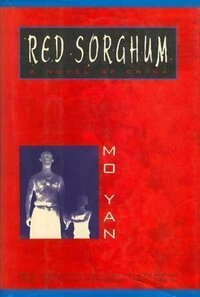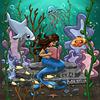Take a photo of a barcode or cover
challenging
dark
funny
tense
slow-paced
Plot or Character Driven:
Character
Strong character development:
No
Loveable characters:
No
Diverse cast of characters:
Yes
Flaws of characters a main focus:
Complicated
challenging
dark
emotional
sad
tense
slow-paced
The misogyny was honestly traumatizing to read and I don't want to spend my time reading about shitheads excusing rape and trying to force the victim to marry her rapist. I don't care how culturally significant this book is, I don't need this in my life.
Graphic: Animal cruelty, Animal death, Body horror, Death, Emotional abuse, Gore, Misogyny, Pedophilia, Physical abuse, Rape, Sexism, Sexual assault, Sexual content, Sexual violence, Violence, Blood, Police brutality, Murder, Sexual harassment, War
easily one of the saddest and most poignant books i've ever read, it's incredible how the author takes a death at the beginning and makes its emotional impact last all the way until the end. Like a lingering ghost, the war epic is haunted by this injustice. Also, there's no sentence that inspires such a unique mix of anticipation and fear as "It's that son of a bitch Pocky Leng!"
challenging
dark
emotional
reflective
sad
tense
medium-paced
Plot or Character Driven:
Character
Strong character development:
Complicated
Loveable characters:
Complicated
Diverse cast of characters:
Yes
Flaws of characters a main focus:
Yes
This is a powerhouse of a book. The story is as rich and as dark as the earth the sorghum grows in. Everything about this book was intense and bloody. Sometimes lyrical, sometimes gruesome, this is not a book for the faint of heart, but it is a book that is a bearer of pain. These were desperate, bloody years in Chinese history. How much was lost, how much cannot be regained. It is deeply heartbreaking, but it also shows the perseverance. I'm glad to have read this book and I know I'll be thinking about it for days.
I am less than half done with this book but am loving it!! The writing is eloquent, poetic, and descriptive to the point that you can smell, taste, feel everything being described. Many of the scenes are dark and graphic but he often interjects a point of natural beauty amidst an otherwise horrific landscape. I find myself creating excuses to steal away for a half hour or so in the middle of the day just to continue the story. At this point it's a 5 star book in my mind.
A couple weeks later and I have finished the book. The final chapter did not live up to the rest of the book for me. The character that rose to dominate some of the plot was not one I liked or identified with nor did I see her as central to the main plot. It was nice to have some of the time gaps filled in but it was done too quickly. All in all, the final chapter felt rushed and out of sync with the rest of the book. Just my feeling. Still, I loved so much about the rest of the book that I wonder if I totally missed something in that last chapter. Perhaps I will reread it someday and have an "aha" moment that puts it all into perspective.
A couple weeks later and I have finished the book. The final chapter did not live up to the rest of the book for me. The character that rose to dominate some of the plot was not one I liked or identified with nor did I see her as central to the main plot. It was nice to have some of the time gaps filled in but it was done too quickly. All in all, the final chapter felt rushed and out of sync with the rest of the book. Just my feeling. Still, I loved so much about the rest of the book that I wonder if I totally missed something in that last chapter. Perhaps I will reread it someday and have an "aha" moment that puts it all into perspective.
challenging
dark
emotional
reflective
medium-paced
Plot or Character Driven:
Character
Strong character development:
Complicated
Loveable characters:
Complicated
Diverse cast of characters:
Complicated
Flaws of characters a main focus:
Yes
I read this for a class on Chinese Film and Fiction - I think I enjoyed it so much because of the class discussion and the ability to place it in a historical/literary context thanks to lectures.
The writing is really graphic and brutal, and the story itself is very tragic. The movie adaptation is also pretty good -- the actress in it, Gong Li, stars in similarly tragic movies based on events in China through the 1900s. I know it's not books, but if you're looking for good stories with history, tragedy, and high emotions, check out her other movies "To Live" and "Farewell My Concubine".
The writing is really graphic and brutal, and the story itself is very tragic. The movie adaptation is also pretty good -- the actress in it, Gong Li, stars in similarly tragic movies based on events in China through the 1900s. I know it's not books, but if you're looking for good stories with history, tragedy, and high emotions, check out her other movies "To Live" and "Farewell My Concubine".
Graphic: Death, Gore, Torture
There are a few incredibly detailed and gory scenes. I recognize that they were well written, but it made me very queasy.
Un romanzo epico, imprescindibile per ogni appassionato di letteratura cinese.
Le vicende del bandito Yu Zhan'ao e della sua famiglia, narrate dal nipote, ci guidano in 40 anni di storia cinese: il banditismo degli anni 20, l’invasione giapponese e le lotte di resistenza contro le forze nipponiche e i collaborazionisti cinesi, l’avvento del comunismo e lo stravolgimento dell’ordine del mondo agricolo degli anni 70.
È un libro crudo, a tratti spietato, con una scrittura brutale che si colora però di un lirismo intenso.
Il fulcro del romanzo è il continuo intreccio tra presente, passato e futuro, in salti temporali che hanno la forma dei ricordi; le linee di confine si smarginano in un tempo indefinito, rendendo la lettura spesso difficoltosa. Ma forse è proprio questo il suo aspetto fondamentale: non esiste un solo orizzonte e la realtà non è altro che un susseguirsi di quadri abbozzati, intrisi di leggende e superstizioni.
Il sorgo è il protagonista dall’inizio alla fine, spettatore silenzioso della tragedia delle vicende umane. È nutrimento, riparo, alcova, letto di morte.
Un libro difficile e imperdibile.
Le vicende del bandito Yu Zhan'ao e della sua famiglia, narrate dal nipote, ci guidano in 40 anni di storia cinese: il banditismo degli anni 20, l’invasione giapponese e le lotte di resistenza contro le forze nipponiche e i collaborazionisti cinesi, l’avvento del comunismo e lo stravolgimento dell’ordine del mondo agricolo degli anni 70.
È un libro crudo, a tratti spietato, con una scrittura brutale che si colora però di un lirismo intenso.
Il fulcro del romanzo è il continuo intreccio tra presente, passato e futuro, in salti temporali che hanno la forma dei ricordi; le linee di confine si smarginano in un tempo indefinito, rendendo la lettura spesso difficoltosa. Ma forse è proprio questo il suo aspetto fondamentale: non esiste un solo orizzonte e la realtà non è altro che un susseguirsi di quadri abbozzati, intrisi di leggende e superstizioni.
Il sorgo è il protagonista dall’inizio alla fine, spettatore silenzioso della tragedia delle vicende umane. È nutrimento, riparo, alcova, letto di morte.
Un libro difficile e imperdibile.





